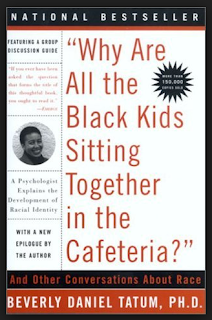Book Review - Why Are All the Black Kids Sitting Together in the Cafeteria? by Beverly Daniel Tatum
I think I heard of this book when I was in grad school and the title caught my attention. I've had it in my queue for awhile and finally got around to reading it. We learned briefly about race identity development in grad school, but this went into more detail.
I was kind of concerned with this one that it would be very academic, jargony, and hard to read. I thought I might start and not finish it because it wouldn't hold my attention. It was a surprisingly easy read that did keep me interested. There were a lot of first-hand experiences that made it feel like a personal narrative.
I'm always interested in the life experiences of others, especially those that are very different from me. Some of the stories were pretty eye-opening. To be honest, there were parts in it where I was like, "Really? C'mon." This is a true testament to how much I don't know about the experiences of black people. (And the book taught me it's okay to say "black people" instead of "African American people.")
It did remind me that everyone has different preferences, though, for basically every aspect of our lives. For example, there was a story in the book about a white dad priding himself on his daughter being "color-blind." He gave the example of his daughter coming home and often talking about her best friend at school. One day when he was picking her up from school, he asked his daughter which girl on the playground was her best friend that she was always talking about and she said, "The girl with the pink tutu on." He was surprised to find that the little girl with the pink tutu on was black... the only black girl on the playground. He really thought that was awesome. The author noted, however, that by not acknowledging the girl as black, that we are denying the black girl's racial identity altogether, which is not right. Now--I don't love this example given that it's a little girl and how would she know better? Also, every person probably feels differently about this. One person might think, "Why did you just say I'm the black girl?" Even if they are the only black person around. While another person might think, "Why are you identifying me by my race?" It's similar to identifying someone in a crowd by their disability. There are ways to identify people that are politically correct and those that are not and the preference lies with us an individuals.
I kind of left the book feeling like no matter what I think or say, there is real potential that I am wrong. I guess this is okay and kind of the nature of dealing with humans. The real impact was hearing people's experiences and gaining a different perspective.


Comments
Post a Comment